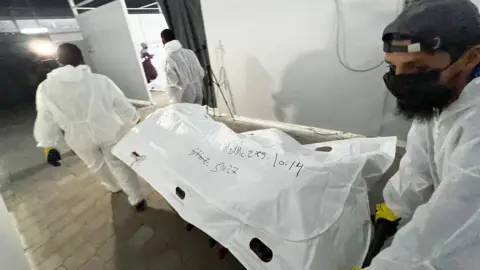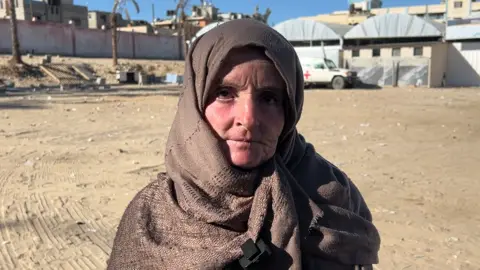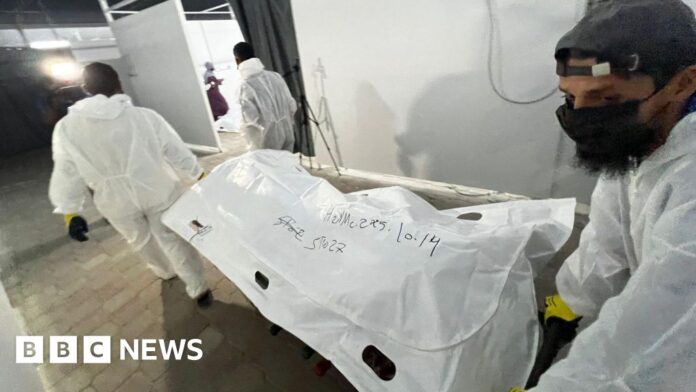 BBC
BBCA health official in Gaza says experts are working to identify the bodies of the 90 Palestinians handed over by Israel in exchange for dead hostages held by Hamas.
If they were unsuccessful, photos would be posted online so families could search for missing relatives, Dr Mohammed Zaqout, director general of hospitals for the Hamas-run health ministry, said.
It is not clear whether the bodies – stored at Nasser hospital in Khan Younis – belong to Palestinians who died in Gaza or in Israeli custody.
Footage filmed by a freelance journalist working for the BBC at Nasser’s mortuary appeared to show the body of a blindfolded man. Another body seemed to have a marks around the wrists and ankles.
The BBC has asked the Israeli military and justice ministry for comment. They have previously rejected accusations of widespread ill-treatment and torture of detainees.
Under last week’s ceasefire agreement with Hamas, Israel has agreed to hand over the bodies of 15 Palestinians in return for every deceased Israeli hostage.
So far, the Israeli military has said the remains of six Israeli hostages have been returned.
The body of another hostage – Nepalese – has also been returned from Gaza, along with the remains of another person who was not a hostage.
Israel has called on Hamas to “make all necessary efforts” to recover the bodies of the remaining 21 deceased hostages as agreed.
The last 20 living hostages were also handed over by Hamas on Monday in exchange for 250 Palestinian prisoners in Israeli jails and 1,718 detainees from Gaza.
Israeli authorities handed over 45 Palestinians’ bodies to the International Committee of the Red Cross (ICRC) on Monday – with another 45 on Wednesday.
The remains were transferred by the ICRC to Nasser hospital.
Speaking outside the facility on Tuesday, Dr Zaqout said the first group of bodies had been kept by Israeli authorities in refrigerators, and that “some are clearly recognisable, while others are difficult to identify”.
“Once confirmed, we will publish the names for the families so they can come forward to identify and bury their loved ones.”
However, Dr Zaqout said health officials had so far received no information to assist them, such as names or the circumstances of death.
“What we received are bodies with codes and numbers. However, we were promised that… we would be provided with the names. We are awaiting further clarification from our colleagues at the International Committee of the Red Cross.
“If we receive the names from [Israel], we will publish them. If not, we will be forced to create a link where photos of the identifiable martyrs will be posted.”

Also outside Nasser hospital was Rasmieh Qdeih from Khuzaa, a town east of Khan Younis.
She was searching for her son Fadi, 36, who has been missing since 7 October 2023, when the Israeli military launched a campaign in Gaza in response to a Hamas-led attack on southern Israel in which about 1,200 people were killed and 251 were taken hostage.
At least 67,938 people have been killed by Israeli attacks in Gaza since then, according to the territory’s health ministry, whose figures are seen by the UN as reliable.
“I don’t know whether he was imprisoned or martyred. I contacted everyone; no-one told me anything,” Ms Qdeih said.
“Every time a prisoner is released, I ask them – have you seen Fadi?… Is he a prisoner, a martyr, or missing? They say ‘no’. Everyone in Negev prison says they haven’t heard that name. Each one tells me something different.”
She said the wait to learn her son’s fate was the most difficult she had ever experienced.
“I’m not upset… I just want to know if my son is among them. If not, if they don’t find my son among these martyrs, I will be shocked.”
“If there’s anything, I’ll recognise him – my son’s leg is amputated, and he has vitiligo… His hair is white. I’d know him,” she added.



